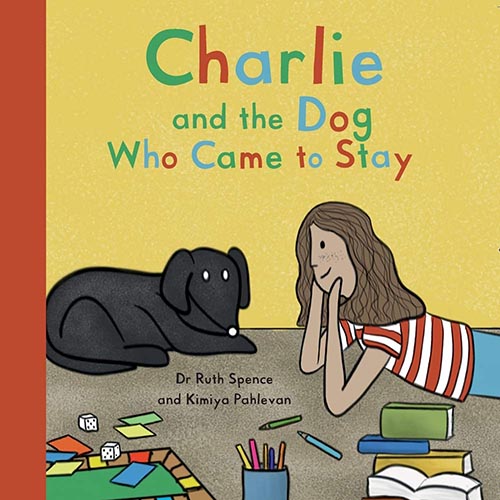
Author and psychologist Dr Ruth Spence has devised a friendly and accessible book that introduces children to the subject of depression and acknowledges and supports those living with it. The use of a ‘black dog’ as a metaphor for depression has been used many times in adult literature, and here it translates well into a story for children, featuring a dog that isn’t frightening or sinister in any way.
“[Charlie] became friends with a dog called Depression. It is not a very good friend. “
A young girl (called Charlie) has moved house, away from her friends. This big change in her life is the catalyst for depression, which is depicted in the story as a large black dog who overwhelms her with its persistent presence. It is shown sometimes towering over her, other times climbing on her so that she literally feels it weighing her down and sapping her energy. Charlie begins to lose interest in the things that used to make her feel happy (cycling, playing games, reading) and other symptoms of depression emerge: anger, grumpiness, tiredness, sleep disturbances, lack of concentration. Charlie’s mum notices the changes in her daughter and decides ‘it is time for Charlie to get rid of her friend’. She finds time to sit with Charlie and talk about the dog, and encourages her daughter to re-boot her hobbies and interests. She distracts her from her sad thoughts for short periods by reading with her. Over time, Charlie is able to give the dog less of her attention, and as she becomes absorbed in other things, it shrinks from a large to a small, more manageable, size…although the depression doesn’t vanish completely, she learns ways to cope with it and keep it in check.
It is reassuring to know that a professional psychologist is behind the book; the messages conveyed have clearly been carefully researched and considered and have been delivered with a lightness of touch that should engage young children. Kimiya Pahlevan’s bold comic-book style illustrations, heavily key lined in black, compliment the story and keep the tone just right. Depression is something that touches the lives of so many children in so many different ways, and we applaud this writer/illustrator team for providing an excellent and much-needed resource to help children struggling with this illness.
 This gentle and reassuring story should chime with any young child who is living with depression, whether it is themselves or someone else who has been affected by it. A useful tool to help children to understand depression and how it can change people's feelings and behaviour, containing practical non-preachy guidance and coping strategies.
This gentle and reassuring story should chime with any young child who is living with depression, whether it is themselves or someone else who has been affected by it. A useful tool to help children to understand depression and how it can change people's feelings and behaviour, containing practical non-preachy guidance and coping strategies. 

